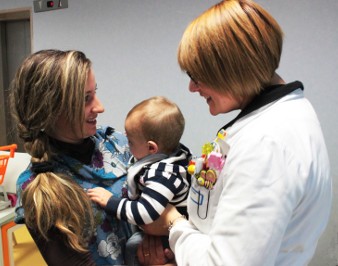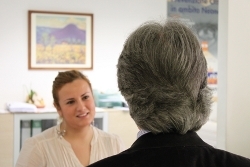
WHAT IS LOW VISION REHABILITATION?
Low vision is a condition of greatly reduced visual capacity, irreversible and bilateral (it affects both eyes), which conditions and limits the autonomy of an individual, compromising the performance of normal daily tasks. Unfortunately, vision loss cannot be regained; however it is possible to learn how to maximize the use of the retinal zones that are still functioning. This goal can be achieved through vision rehabilitation, which consists of a personalized path that – through an appropriate classification of the visually impaired person – allows the preservation of the residual vision (optimizing its use). In this way, a person can overcome some “disabilities” and maintain or recover their social life, communication and planning abilities, improving their quality of life.
WHEN IS IT NECESSARY?
Vision rehabilitation is a path that should be undertaken by people with low vision regardless of the cause and the age of onset.
WHAT DO YOU HAVE TO DO?
The first step of vision rehabilitation is the classification of the visually impaired person, with particular attention given their requests, needs and psychological difficulties related to their visual impairment. This phase requires the intervention of several professional figures with specialized competences i.e. a psychologist, an ophthalmologist and a rehabilitating orthoptist. The actual rehabilitation period then follows with a series of meetings in which the visually impaired person learns to make the best use of aids, identified to meet their requests (optical, electronic and computer aids). Sometimes home-based hand-eye coordination exercises are also assigned with appropriate checks in subsequent meetings. In the future it will be possible to do exercises from home using a computer equipped with special software.
In some cases it may be necessary to use visual stimulation (biofeedback), which is practiced using an instrument called a microperimeter.
HOW LONG DOES A REHABILITATION SESSION LAST ON AVERAGE?
 Visual rehabilitation sessions can require a varied amount of time (but usually a single session doesn’t last for more than an hour) depending on the visual condition of the individual, their requests, age, the characteristics of the aids, etc. In the case of visual stimulation through biofeedback, the sessions last for half an hour on average.
Visual rehabilitation sessions can require a varied amount of time (but usually a single session doesn’t last for more than an hour) depending on the visual condition of the individual, their requests, age, the characteristics of the aids, etc. In the case of visual stimulation through biofeedback, the sessions last for half an hour on average.
HOW OFTEN IS IT NECESSARY TO GO TO A SPECIALIZED CENTRE?
The frequency of visual rehabilitation sessions is variable. On average 4-5 meetings (1-2 times per week) may be sufficient to learn how to use the optical, electronic and/or computer aids. When necessary visual stimulation techniques may be used, in which case, some cycles of treatment are practiced, (usually 10-15 minute sessions, twice a week), possibly to be repeated over time after a period of observation.
WHAT RESULTS CAN BE OBTAINED?
During visual rehabilitation the still functioning retinal areas are identified and exploited. The objective of a rehabilitative program is to enable the visually impaired person to utilize these areas as much as possible, so as to improve their visual perception and quality of life.







